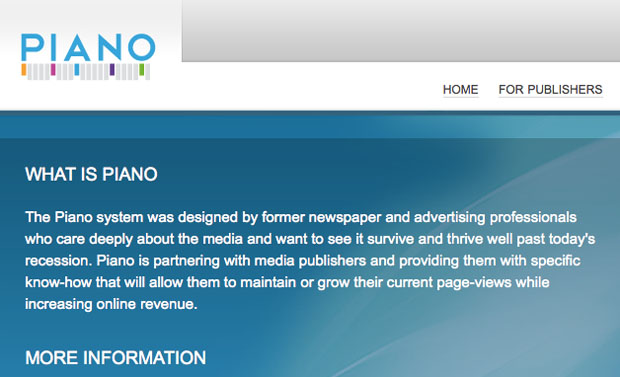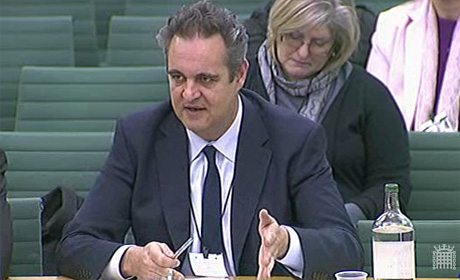 Journalisted is an independent, not-for-profit website built to make it easier for you, the public, to find out more about journalists and what they write about. It is run by the Media Standards Trust, a registered charity set up to foster high standards in news on behalf of the public, and funded by donations from charitable foundations. Each week Journalisted produces a summary of the most covered news stories, most active journalists and those topics falling off the news agenda, using its database of UK journalists and news sources.
Journalisted is an independent, not-for-profit website built to make it easier for you, the public, to find out more about journalists and what they write about. It is run by the Media Standards Trust, a registered charity set up to foster high standards in news on behalf of the public, and funded by donations from charitable foundations. Each week Journalisted produces a summary of the most covered news stories, most active journalists and those topics falling off the news agenda, using its database of UK journalists and news sources.
Redknapp and Capello, Syria and Homs, and Leveson
for the week ending Sunday 12 February
- Harry Redknapp, his acquittal and England management rumours lead the news
- Luis Suarez, Leveson Inquiry and Abu Qatada covered lots
- Romanian PM resignation, Russian protests and Turkmenistan elections covered little
Covered Lots
- Harry Redknapp walks free from court, acquitted of cheating the public revenue, and into speculation about managing the England football team, 464 articles – succeeding Fabio Capello, 462 articles
- The death toll rises as Syrian government forces bombard the city of Homs, 233 articles
- The Leveson Inquiry continues, hearing from witnesses including Mail editor Paul Dacre and recalled editors James Harding and Dominic Mohan, 190 articles
- Luis Suarez avoids shaking Patrice Evra’s hand, reigniting racism row, before apologising, 187 articles
- An immigration commission rules that radical cleric Abu Qatada can be released on bail, 143 articles
Covered Little
- Emil Boc resigns as Prime Minister of Romania following protests against austerity measures, 17 articles
- Mikhail Gorbachev criticises Vladimir Putin following protests and ahead of March presidential election, 6 articles
- Elections in Turkmenistan, with opposition candidates all praising the incumbent, 2 articles
- Brazilian journalist Mario Randolfo Marques Lopes and his girlfriend are kidnapped and killed, 1 article
Political ups and downs (top ten by number of articles)
- David Cameron: 588 articles (-7% on last week)
- Andy Burnham: 201 articles (+1446% on last week)
- Ed Miliband: 167 articles (+44% on last week)
- George Osborne: 163 articles (-14% on last week)
- Andrew Lansley: 143 articles (+134% on last week)
- Nick Clegg: 135 articles (-26% on last week
- William Hague: 117 articles (+3% on last week)
- Tony Blair: 100 articles (-4% on last week)
- Boris Johnson: 88 articles (-21% on last week)
- Theresa May: 87 articles (+26% on last week)
Celebrity vs Serious
- A busy week for Adele, who wins six Grammy Awards after controversial remarks by Karl Lagerfeld, 79 articles vs. the arrest of five Sun journalists and three others by Operation Elveden police, investigating bribery and corruption, 45 articles
- At the BAFTAs, Meryl Streep wins best actress for her portrayal of Margaret Thatcher, 61 articles vs. protest in Greece over austerity bill vote, 58 articles
- Jean Dujardin, meanwhile, takes the best actor award for his performance in ‘The Artist’, 29 articles vs. the ConservativeHome website comes out against proposed health reforms, 32 articles
Eurozone leaders (top ten by number of articles)
- Lucas Papademos (Greece): 105 articles (+125% on last week)
- Angela Merkel (Germany): 70 articles (-14% on last week)
- Nicolas Sarkozy (France): 70 articles (-35% on last week)
- Mario Monti (Italy): 16 articles (-20% on last week)
- Mariano Rajoy (Spain): 7 articles (-53% on last week)
- Enda Kenny (Ireland): 7 articles (-22% on last week)
- Mark Rutte (The Netherlands): 5 articles (+150% on last week)
Who wrote a lot about… Fabio Capello
- Matt Lawton – 9 articles (MailOnline)
- Oliver Kay – 9 articles (The Times)
- Sam Wallace – 7 articles (The Independent)
Long form journalism
- 4,446 words: ‘Suleiman Kerimov, the secret oligarch’ by Catherine Belton, Financial Times, 10 February 2012
- 4,140 words: ‘Seeing red’ by Mark Franchetti, The Sunday Times, 12th February 2012
- 3,888 words: ‘A class apart’ by Charles Murray, The Sunday Times, 12th February 201
The Media Standards Trust, which runs journalisted, won the ‘One to Watch’ category at the Prospect Think Tank Awards
Read the Hacked Off live blog on the Leveson inquiry and follow our Twitter feed @hackinginquiry.
Visit the Media Standards Trust’s Churnalism.com – a public service for distinguishing journalism from churnalism
Read the MST’s submission to parliament’s Joint Committee on Privacy and Injunctions and the House of Lords Communications Select Committee on investigative journalism
For the latest instalment of Tobias Grubbe, journalisted’s 18th century jobbing journalist, go to journalisted.com/tobias-grubbe



